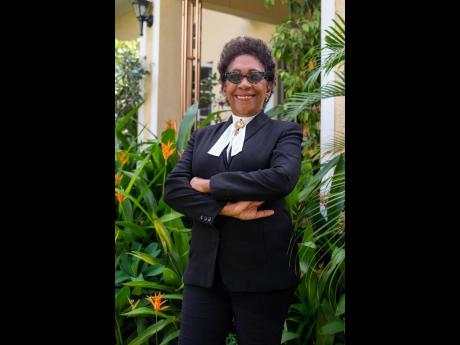Vindicated: Privy Council overturns conviction of former cop
Lawyers for ex-constable Lescene Edwards, whose murder conviction was overturned by the Privy Council Monday, say they are pleased that their client has been vindicated in the death of his children’s mother and will be seeking compensation for constitutional breaches immediately.
The former policeman was found guilty of the 2003 murder of his girlfriend, Aldonna Harris-Vasquez, who married a foreigner a month before she was killed by a single gunshot wound to the head in the bathroom of her St Andrew home.
The prosecution had alleged that Edwards killed the university student and then staged the scene to give the appearance that she committed suicide.
However, Edwards, who had maintained that Harris-Vasquez had committed suicide, was tried 10 years after the incident and given a life sentence with the possibility of parole after 35 years. ,
But the Privy Council, in its decision handed down Monday, not only found that a “substantial miscarriage of justice has occurred” but that the decade-long delay had breached Edwards’ constitutional right to a fair trial within reasonable time.
Attorney-at-law Valerie Neita-Robertson, one of the lawyers representing Edwards and who had maintained that he should never have been convicted, said the Privy Council’s ruling validated the arguments of the defence that their client was innocent.
“I said that the case should not have been tried, as the Crown did not have a case, but it is interesting that the court found that the prosecution’s theory was a near impossibility,” she said.
Neita-Robertson said that Edwards’ legal team would be pursuing redress for the constitutional breaches “with the same energy we use in this matter and have already started the paperwork for damages”.
“We know that he was without salary all this time, the pain and suffering that he went through, the damage to his reputation, and we know that his two children had to grow up without him, and we will be considering all of that,” she said.
Neita-Robertson also indicated that Edwards would also be seeking compensation for the miscarriage of justice in light of the Privy Council’s recommendation for it to be considered by the Jamaican authorities. However, she said that preliminary discussions will be held with the authorities.
In the meantime, the lawyer said Edwards’ family was happy and relieved, especially his children and brother who stood by him throughout the trial and believed in his innocence and are just waiting for him to be released, and she will be following up on his release to ensure that there is no undue delay.
The Privy Council also found that Edwards’ conviction was unsafe after admitting fresh evidence from three experts who, together, found that the evidence pointed more towards suicide than murder.
During the trial, the local expert had given evidence that Edwards had written a suicide note that was reportedly found on the scene.
An overseas expert for the defence had found that his analysis could neither identify nor eliminate Edwards as the author of the note. A similar conclusion was made about the likelihood of Harris-Vasquez’s authorship.
Ballistic experts had also indicated that no gunshot residue was found on the deceased or Edwards’ hand. There was also none found on the deceased’s nightgown, which was tested weeks later.
However, regarding the fresh evidence adduced, Mark Mastaglio, a ballistics expert; Angela Shaw, a gunshot residue expert; and Gillian Leak, a forensic consultant on bloodspatter evidence, all found that position of the deceased woman’s body and the height of the bullet hole in the bathroom door all supported the theory of suicide.
Shaw also concluded that the absence of gunshot residue on the deceased’s hands did not support the view that Edwards was guilty. She further noted that if Edwards had shot Harris-Vasquez, there would have been bloodspatter on his person or clothing.
“There is simply no satisfactory explanation of how the defendant could have managed to murder the deceased in the very confined space of the bathroom, then move the body, open the door and appear a very short time afterwards in the living room without any blood being seen on him or his clothes, and without any bloodstains or bloodied footprints being found anywhere outside the bathroom,” the Privy Council said of the fresh forensic evidence.
Attorneys-at-law Deborah Martin and Patrick Atkinson, QC, also represented Edwards.

